Is Wall Street a problem for Hillary Clinton?
- Published
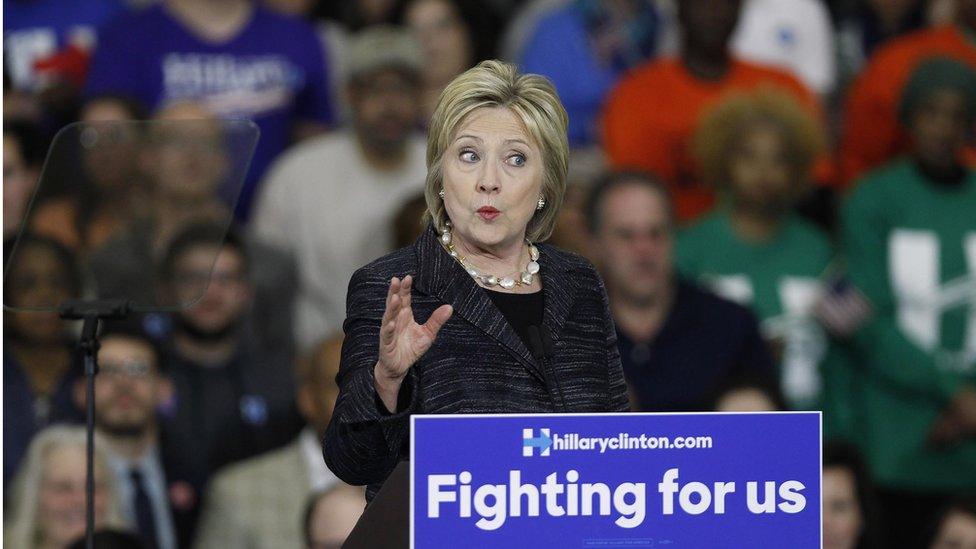
There is a saying in politics, "If you want a friend, get a dog."
Would-be US Democratic presidential candidate Hillary Clinton may know that better than anyone. She has faced scandal around her husband's affairs, the terrorists attacks in Benghazi, and the use of a personal server to store her emails when she was secretary of state.
Liberals accuse her of being too close to big business, conservatives says she is more liberal than President Obama.
She has always had one steadfast group of supporters though - Wall Street.
The 2016 presidential election is proving a trying time for this longstanding relationship. Wall Street-hating and banker-bashing has been a theme raised by Ms Clinton's Democratic opponent and Republican rivals.
Public disapproval of Wall Street connections is placing her between a rock and hard place; to turn away from money she needs to run her campaign, or risk losing voters fed-up with the Washington/Wall Street bond.
Wall Street history
Hillary Clinton's Wall Street ties date back to when her husband, former President Bill Clinton, was in politics.
"She and her husband have been in politics a long time and Wall Street is a big donor for all parties," says Larry Sabato, director of University of Virginia's centre for politics.
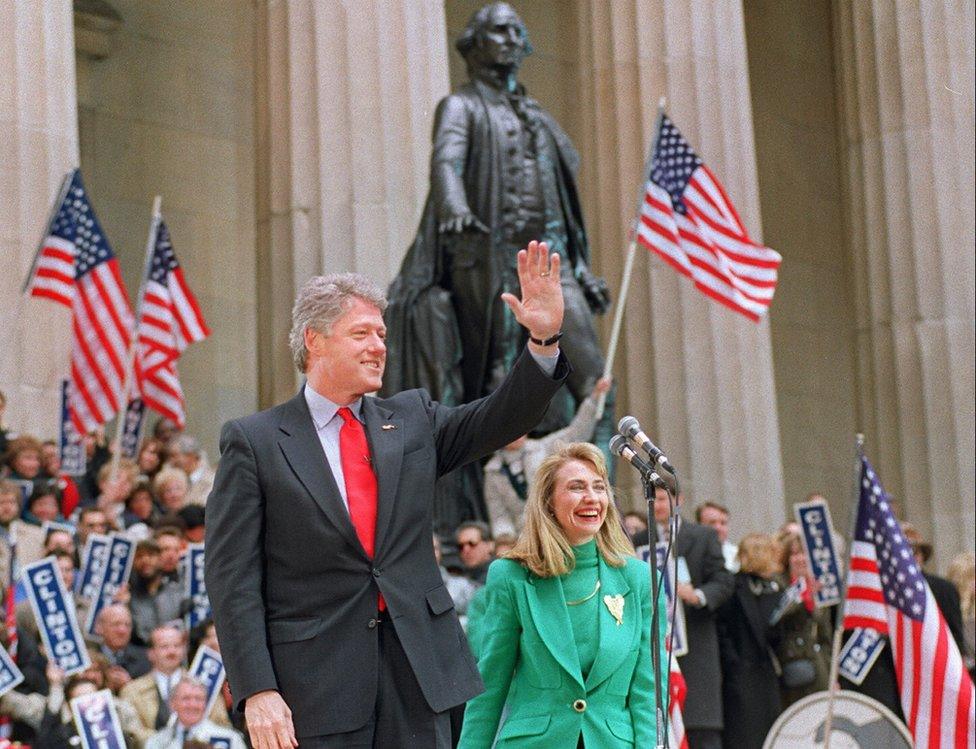
In 1992 Hillary Clinton campaigned on Wall Street during her husband's run for president
Reaching out to Wall Street's deep pocket in the 1990s and early 2000s was seen as a necessity - not a potential blemish.
That changed after the financial crisis. Being seen as friendly with the individuals and institutions that brought down the economy and were never held accountable has been toxic.
"These connections have been a liability since 2008," says Mr Sabato. "President Obama got plenty of Wall Street money too and that wasn't an issue."
Top donors
According to the Center for Responsive Politics, between 1999 and 2016 Mrs Clinton raised a total of over $400m (£278m) from all donors for her four campaigns (two for senate, two for the president).
The biggest group supporting her throughout that time have been lawyers - many of whom represent big banks and retirees - who are the largest group of donors to nearly every campaign in 2016.
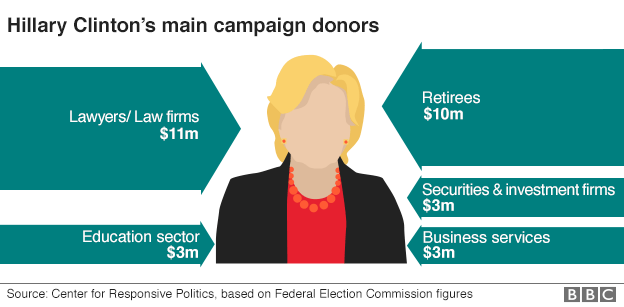
But three of her top five individual donors have been Wall Street banks - Goldman Sachs, Citibank, and JP Morgan.
And throughout her career, donors from the securities and investment sector have donated over $14m, while those classified as working in the finance and commercial banking industry have added another $7.8m.
Her Democratic primary competitor Bernie Sanders relies far more on small donations from individual donors. Nearly three-quarters of Senator Sanders's donations have been under $200, while only 17% of donations to Hillary Clinton have been under $200.
Speaking to them
Wall Street does not just donate to Mrs Clinton's campaigns, it also pays her for speeches.
Senator Sanders has raised the issue of speaking fees regularly to argue she has been bought by Wall Street.
"Can you really reform Wall Street when they are spending millions and millions of dollars on campaign contributions, and when they are providing speaker fees to individuals?" he asked during a debate.
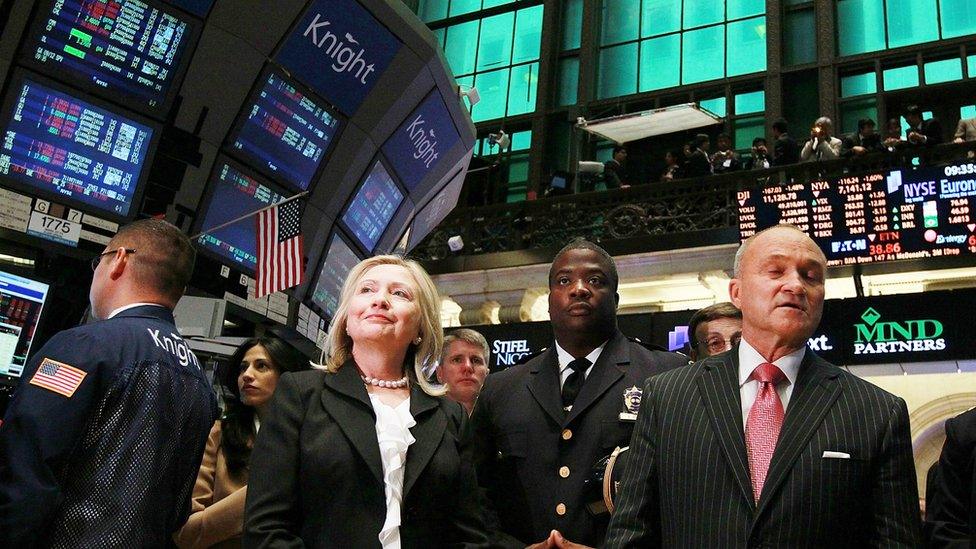
Hillary Clinton at the New York Stock Exchange
Mrs Clinton's recent tax returns, external and detailed press reports, external suggest she earned substantial sums giving speeches to big banks up until she launched her presidential campaign. In 2013 she typically received $225,000 per speech.
When asked why she had accepted $675,000 from Goldman Sachs for three speeches, the Democratic front-runner said that was the amount the bank had offered.
Personal fans
Not only does Mrs Clinton have the financial support of Wall Street, she has a lot of personal support from major players.
Goldman Sachs chief executive, Lloyd Blankfein, has been a big supporter of hers in the past. Mr Blankfein has not publicly endorsed any candidate in the 2016 campaign, saying he fears it might hurt their chances.
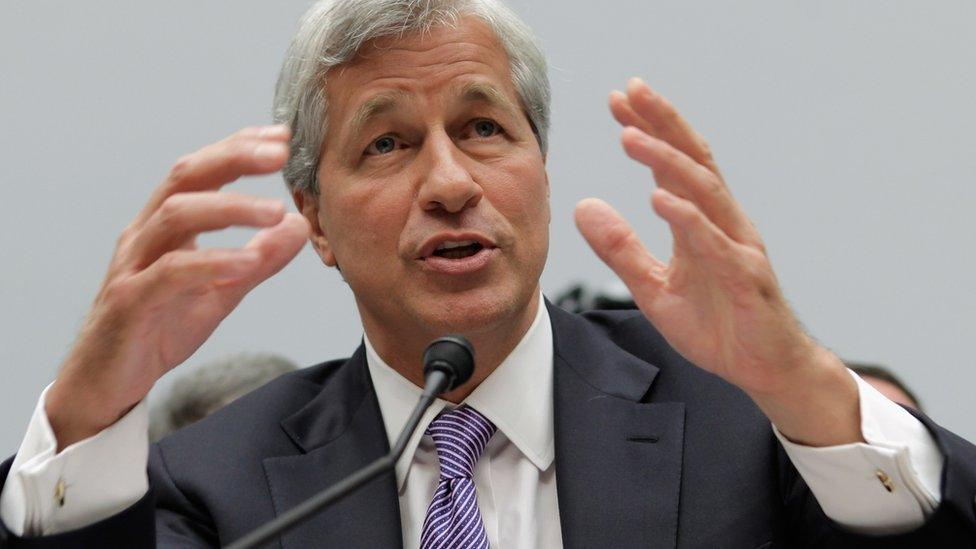
JP Morgan head Jamie Dimon has given to Mrs Clinton's past campaigns but has held off this time round
JP Morgan chief Jamie Dimon has been a regular contributor to Hillary Clinton and other Democrats for years. Mr Dimon donated the maximum amount to her presidential run in 2008. He and his wife also donated to both Hillary Clinton's senate runs and to Bill Clinton's presidential re-election campaign in 1996.
This time around, Mr Dimon has taken the same approach as Mr Blankfein and has not publicly endorsed or donated to a campaign.
Tough on Wall Street
Mrs Clinton has argued Wall Street donations never influenced her voting record as a senator, and would not as president.
"You will not find that I ever changed a view or a vote because of any donation that I ever received," she said during a debate.
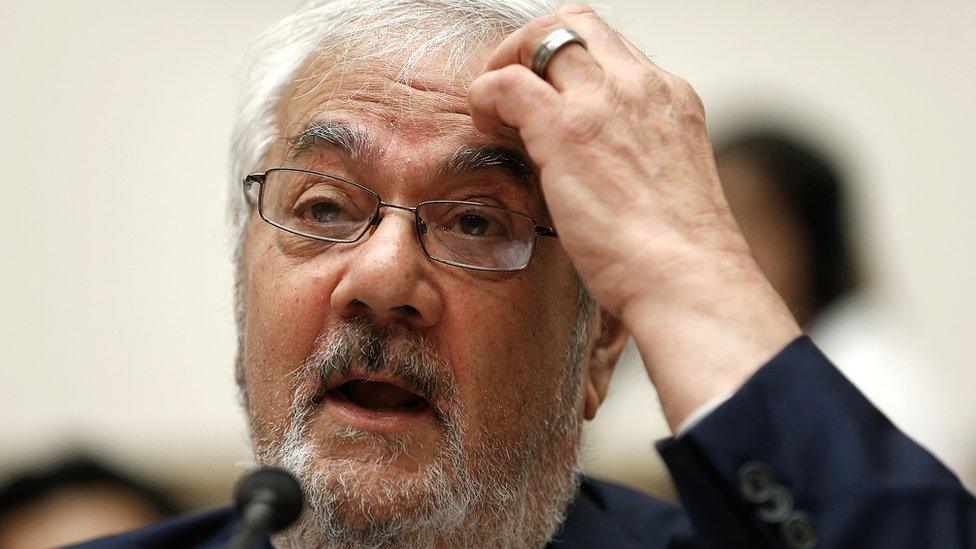
Barney Frank who co-wrote the Wall Street reform laws supports Hillary Clinton
That claim is hard to verify because as a senator from New York, Wall Street was one of her constituents.
She has put forward proposals to increase oversight of banks and other financial institutions, including closing a loophole that allows banks to trade taxpayer backed money through hedge funds.
In 2008 she voted for the Dodd-Frank Wall Street reform laws, and wrote in an opinion piece that she believed bailout money needed to be accompanied by new stricter regulations.
"The American people deserve to know that this isn't a blank cheque," she wrote.
But in 2008, then Secretary Clinton also said that she supported the bailout because she knew it would help banks and keep jobs in New York.
"I think the banks of New York and our other financial institutions are probably the biggest winners in this [bailout], which is one of the reasons why in the end, despite my serious questions about it, I supported it," she said in a radio interview, external.
She has the support of former Congressman Barney Frank - namesake of the Wall Street reform laws - and also former Commodity Futures Trading Commission chair Gary Gensler, who made himself unpopular with Wall Street by supporting stricter regulation of derivatives, an investment tool that fuelled the financial crisis.
Unbreakable bond
Mrs Clinton's biggest problem is making the case that she has been, and will continue to be, tough on Wall Street while still relying on them for donations.
So far her criticism of Wall Street behaviour and calls for more regulation have not stopped donations from coming in. Wall Street banks have said they prefer her calm middle of the road attitude to the extreme approaches of other candidates.
Likewise, Mrs Clinton has continued to fundraise from Wall Street donors because she knows the campaign will need the money as the election stretches out.
The question for both is will the relationship put off voters, or can they maintain it all the way to the White House?